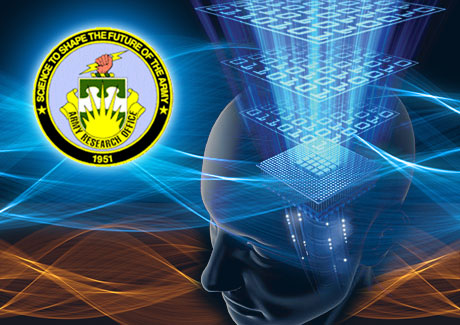From: uci.edu
 Researchers get grant to develop communication system based on thoughts, not speech A team of UC Irvine scientists has been awarded a $4 million grant from the U.S. Army Research Office to study the neuroscientific and signal-processing foundations of synthetic telepathy. The research could lead to a communication system that would benefit soldiers on the battlefield and paralysis and stroke patients, according to lead researcher Michael D’Zmura, chair of the UCI Department of Cognitive Sciences.  Michael D’Zmura “Thanks to this generous grant we can work with experts in automatic speech recognition and in brain imaging at other universities to research a brain-computer interface with applications in military, medical and commercial settings,” D’Zmura says. The brain-computer interface would use a noninvasive brain imaging technology like electroencephalography to let people communicate thoughts to each other. For example, a soldier would “think” a message to be transmitted and a computer-based speech recognition system would decode the EEG signals. The decoded thoughts, in essence translated brain waves, are transmitted using a system that points in the direction of the intended target. “Such a system would require extensive training for anyone using it to send and receive messages,” D’Zmura says. Initially, communication would be based on a limited set of words or phrases that are recognized by the system; it would involve more complex language and speech as the technology is developed further.” D’Zmura will collaborate with UCI cognitive science professors Ramesh Srinivasan, Gregory Hickok and Kourosh Saberi. Joining the team are researchers Richard Stern and Vijayakumar Bhagavatula from Carnegie Mellon University and David Poeppel from the University of Maryland. The grant comes from the U.S. Department of Defense’s Multidisciplinary University Research Initiative program, which supports research involving more than one science and engineering discipline. Its goal is to develop applications for military and commercial uses. |
Related: Military Use Of The Occult, Remote Viewing
New Military-occult Technologies for Psychological Warfare
Plan Nine From Outer Space
The Colour out of Space
Many Scientists are Convinced that Man Can See the Future
The Out-of-Body Experience as Dimensional Translocation
The Remote Viewing Archives
Ancient Understanding will Usher in Next Information Age
Scientists on Acid: The Story Behind “Changing Images of Man”
The Body Eclectic (Part One)
The Body Eclectic (Part Two)
Down the Scole Hole
Remote Viewing Underground UFO Bases
A New Interpretation of Psi Phenomena
Do Not Offend Water - It Remembers Every Word You Say
Russian DNA Discoveries Explain Human 'Paranormal' Events
Cause and defect
Shaking Hands with Our Future
Holographic Reality & Spiritual Science
Brain Machine Interfaces
In A First, Scientists Develop Tiny Implantable Biocomputers
The next big bang: Man meets machine
Team develops DNA switch to interface living organisms with computers
Mind at Light Speed - A New Kind of Intelligence
Red Ice Creations Radio - Kevin Warwick - "I, Cyborg": Implants, RFID, Microchips & Cybernetics
Kevin Warwick - Artificial Intelligence & The Rise of the Machines in 2020
Pentagon Prepares To Build $130bn Robot Army




No comments:
Post a Comment